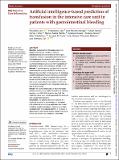Artificial intelligence-based prediction of transfusion in the intensive care unit in patients with gastrointestinal bleeding
Author(s)
Levi, Riccardo; Carli, Francesco; Arévalo, Aldo Robles; Altinel, Yuksel; Stein, Daniel J; Naldini, Matteo Maria; Grassi, Federica; Zanoni, Andrea; Finkelstein, Stan Neil; Vieira, Susana M; Sousa, João; Celi, Leo Anthony G.; Barbieri, Riccardo; ... Show more Show less
DownloadPublished version (786.5Kb)
Publisher with Creative Commons License
Publisher with Creative Commons License
Creative Commons Attribution
Terms of use
Metadata
Show full item recordAbstract
Objective Gastrointestinal (GI) bleeding commonly requires intensive care unit (ICU) in cases of potentialhaemodynamiccompromise or likely urgent intervention. However, manypatientsadmitted to the ICU stop bleeding and do not require further intervention, including blood transfusion. The present work proposes an artificial intelligence (AI) solution for the prediction of rebleeding in patients with GI bleeding admitted to ICU. Methods A machine learning algorithm was trained and tested using two publicly available ICU databases, the Medical Information Mart for Intensive Care V.1.4 database and eICU Collaborative Research Database using freedom from transfusion as a proxy for patients who potentially did not require ICU-level care. Multiple initial observation time frames were explored using readily available data including labs, demographics and clinical parameters for a total of 20 covariates. Results The optimal model used a 5-hour observation period to achieve an area under the curve of the receiving operating curve (ROC-AUC) of greater than 0.80. The model was robust when tested against both ICU databases with a similar ROC-AUC for all. Conclusions The potential disruptive impact of AI in healthcare innovation is acknowledge, but awareness of AI-related risk on healthcare applications and current limitations should be considered before implementation and deployment. The proposed algorithm is not meant to replace but to inform clinical decision making. Prospective clinical trial validation as a triage tool is warranted.
Date issued
2021-01Department
Massachusetts Institute of Technology. Institute for Data, Systems, and Society; Massachusetts Institute of Technology. Institute for Medical Engineering & ScienceJournal
BMJ Health and Care Informatics
Publisher
BMJ Pubilshing Group
Citation
Levi, Riccardo et al. “Artificial intelligence-based prediction of transfusion in the intensive care unit in patients with gastrointestinal bleeding.” BMJ Health and Care Informatics 28, 1 (January 2021): e100245 © 2021 The Author(s)
Version: Final published version
ISSN
2632-1009